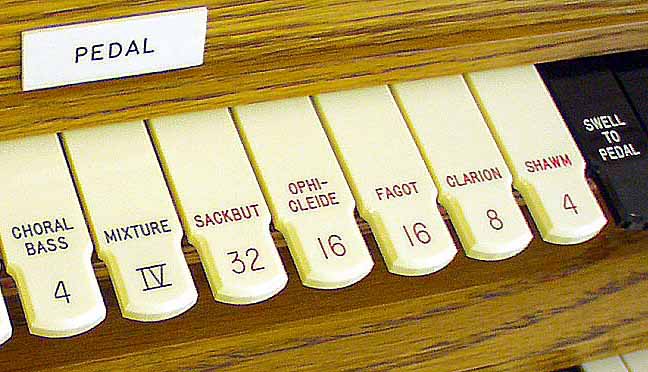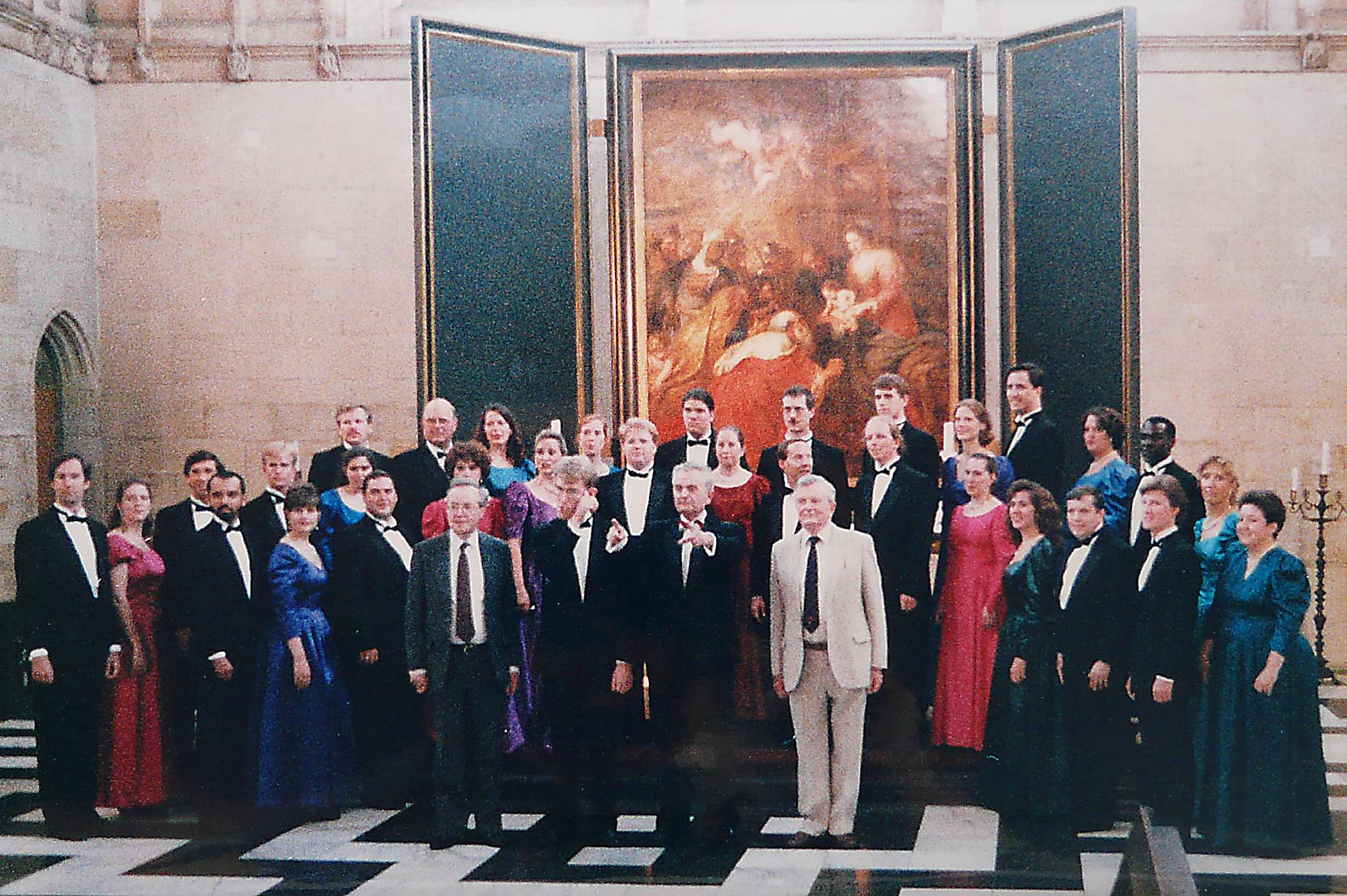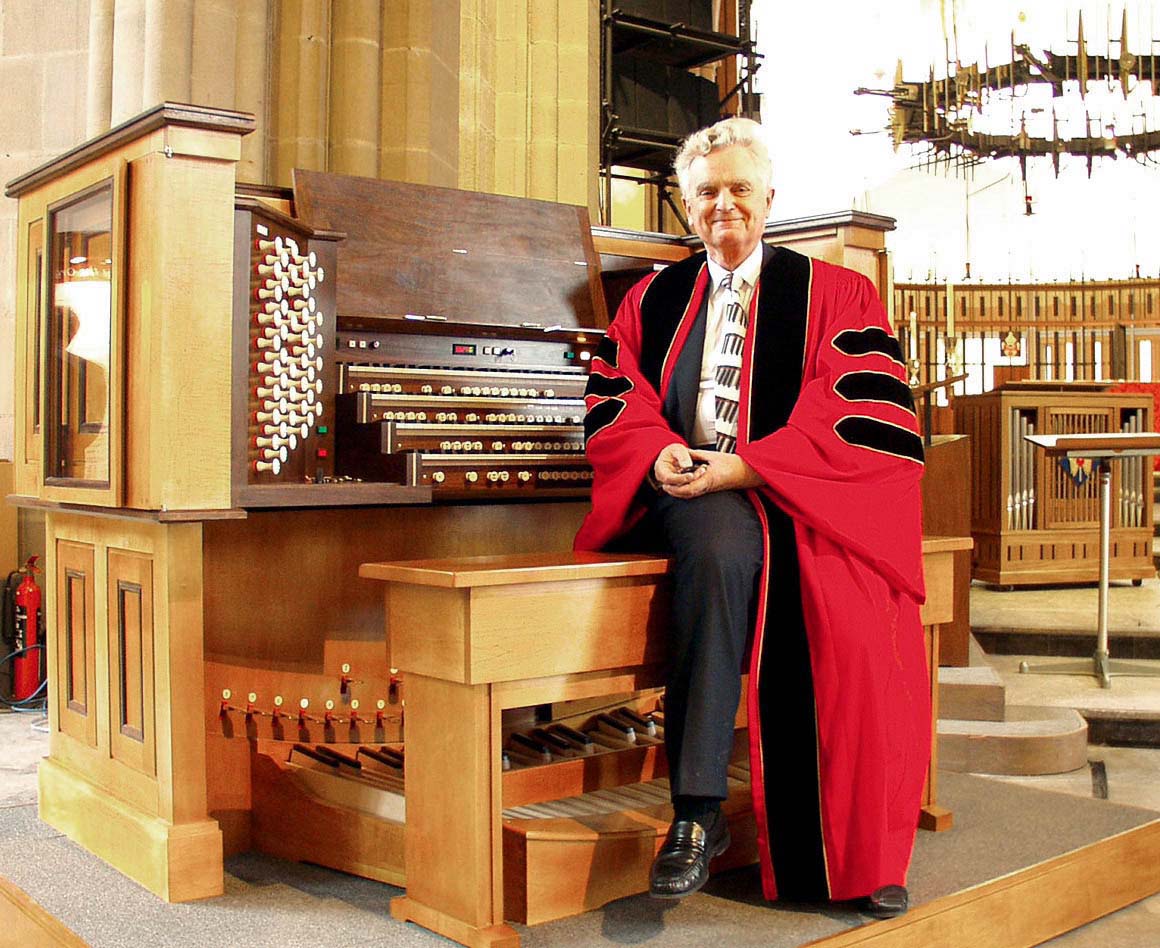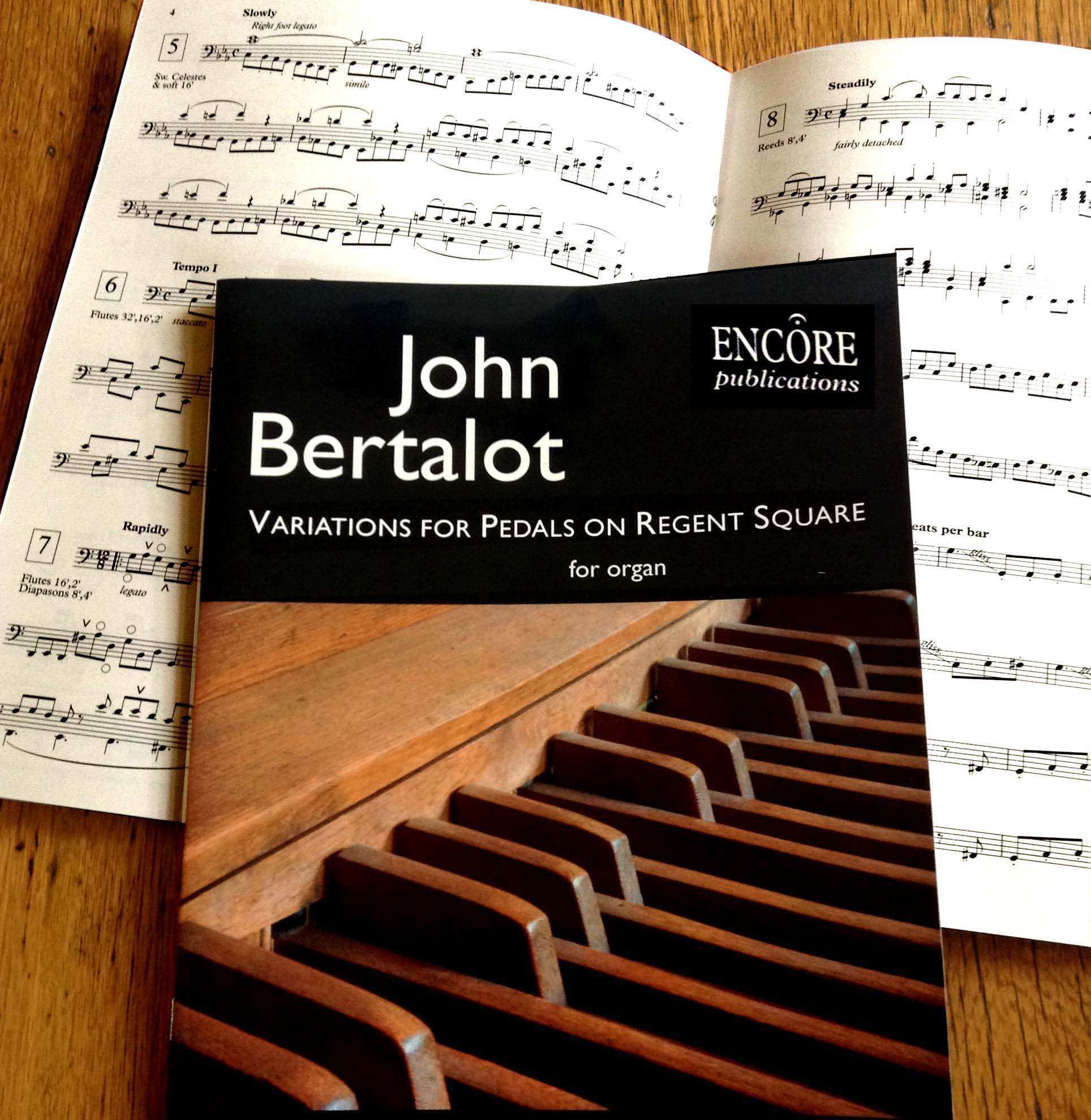How to transform your choir
and fill your stalls
with enthusiastic singers
19 Is your rehearsal like this?
I hope not!

by Dr John Bertalot
Organist Emeritus, St. Matthew's Church, Northampton
Cathedral Organist Emeritus, Blackburn Cathedral
Director of Music Emeritus, Trinity Episcopal Church, Princeton, NJ, USA
I recently attended rehearsals by two very different choirs and learnt a great deal from the contrast between them.
The first rehearsal was a demonstration rehearsal for singers in Lancashire led by the assistant conductor of The Sixteen – the highly professional choir which gives concerts to packed audiences all over the world.
(They gave a concert in Blackburn Cathedral that evening which mesmerized their audience. But earlier in the day there was this rehearsal for some 60 singers from many choirs who had come to learn from an expert how to sing well.)
Everything that that conductor did was constructive and very clear:
He demonstrated to the singers how they should stand,
how they should breathe,
how they should produce their voices,
how they should sing in musical phrases,
how they could blend by listening to each other,
how they should sing the words clearly,
how they should sing the words with meaning ...
in fact everything that singers should do he enabled them to achieve through speaking clearly and making everything positive. The whole atmosphere of that rehearsal was creative and encouraging. We were all uplifted by that experience.
The other rehearsal was by a potentially good church choir led by a dedicated choirmaster. But he and they demonstrated a number of shortcomings which some church choirs share, but which are so simple to correct. What were those faults?
1. PUNCTUALITY ?
The church choir rehearsal was due to begin at 8.0 pm. ‘We’d better wait for the other singers to arrive before we start,’ said their good-natured choirmaster. NO! If your practice is due to begin at 8.0 pm, then it’s vital that that’s the time the choirmaster should say, ‘Good evening! Let’s begin.’
It doesn’t matter if the choir is incomplete, for once you begin to wait for latecomers, unpunctuality will spread to the other singers and lateness will become acceptable. I’ve seen this happen with so many other choirs.
But punctuality will become the norm when choirmasters begin their rehearsals exactly on time, even when singers are missing.
And so what should the choirmaster do when latecomers arrive? He should smile at them and say ‘Welcome!’ (for they may have a good excuse for being late), but at the end of the rehearsal he should always ask them, one on one, if there was a problem. This will show those singers that punctuality and their presence are important to you and to their colleagues.
On the other hand, if certain singers tend to arrive late on purpose, the choirmaster could say, ‘We need to rehearse that passage again with everybody, for it must be right on Sunday.’ This will give an element of peer pressure on those late singers, for they let down their colleagues, and that’s more significant to them than letting down the choirmaster.
2. BEGIN WELL ?
This church choir began their practice by rehearsing a simple anthem. That was good, for it meant that they would be likely to sing it well, rather than tackling more demanding music. When a practice begins well, it will tend to continue well. But the reverse is also true.
But there’s an even better way to begin a practice well, and that is to sing warm-ups. My last article dealt fully with warm-ups, but I didn’t mention the use of different vowels: ee – oo – eh – aw – ah. It’s helpful to add a gently hummed ‘mm’ to these vowels – mmee – mmoo, etc. This will help to produce forward tone. Warm-ups not only enable choristers to begin to sing well, but they also give the singers a sense of corporate identity so that they quickly become a disciplined body of singers.
This was reinforced for me when I watched the rehearsal led by The Sixteen’s deputy conductor. The first 45 minutes of his demanding 3-hour rehearsal were spent entirely on warm-ups! Warm-ups would be the norm when he conducted his professional colleagues. If warm-ups are essential for those singers, how much more necessary are they for amateur singers.
Choose some of the warm-ups in my last article and make up your own as well.
Ten minutes singing warm-ups before your hour’s rehearsal will transform your choir – not only their singing but they will also give them a sense of self-discipline and corporate identity.
3. ALWAYS SING MUSICALLY ?
And then this other church choir rehearsed a psalm. ‘Sing the chant, counting the notes from one to 10, and then count backwards for the second half,’ said their choirmaster.

I’ve heard several choirs rehearse chants like this, and it’s unhelpful, for they sing the notes mechanically instead of musically. That’s bound to happen. The notes may be right after having sung the chant several times but, having sung them unthinkingly, they can do no other than sing the psalm mechanically, for that’s how they’ve been rehearsed!
The same is true for rehearsing hymns. The notes need to be practised musically with a sense of phrasing, for then the singing of the words will also tend to be musical.
They should have sung the chant like this:
Crescendo through the reciting notes at the beginning of each quarter; sing the next note firmly (for it will come on an important word or syllable – that’s how psalms are pointed). The last note of each quarter should be sung lightly so that the musical flow does not stop at the half- or whole-verse, but so that there’s a continual sense of forward movement. Many choirs sit heavily on the last word of half- and whole-verses; that’s why they sound so dull.
My soul doth / magnify the / Lord, // and my spirit hath re-/ joice’d in / God my / Sav iour.
For he / hath re- / garded // the / low-li-ness / of his / handmaiden.
Many church choirs will stress the last syllable of ‘handmaiden’. (handmaiDEN). Why this is I do not know; it’s a good example of original sin, for it’s so prevalent! But unlike original sin, it’s easy to cure!
Ideally psalms should be sung with the same syllabic stresses as steady, intelligent reading. So ask your choir to say the word ‘hand-maid'n’ and they’ll say it correctly, with the stress on ‘hand’. Then ask them to sing that one word, and many will return to their sinful ways. So ask them if they sang it as they said it. This will make them begin to correct their own faults, and remember to do it right on Sunday. (A golden rule for choirtraining is to get your choir to tell you what you want to tell them! That way they’ll take much more interest in how to sing well.)
Then ask your choir to read the first couple of verses flowingly. This is where they’ll immediately speak in a low voice, as though they were reciting the 13-times table in Greek! Even the sopranos will mumble like asthmatic basses! No! Show them how to lift the pitch of their voices – to project their speaking so that it reaches Grandma at the back of the church. You may have to make several attempts at this before they get the idea.
Once they achieved this, ask them to sing the words to the chant in the same intelligent way. Again, they’ll have to try this several times before they achieve what you want, but once they get the idea, your rehearsal will have wings!
4. MAKE YOUR CRITICISMS WHOLLY PRACTICAL ?
(a) RIGHT NOTES
This church choirmaster wasn’t happy with the way his choir sang their next anthem. ‘It sounds plodding,’ he said, ‘it needs to sound more musical. Do something about it.’ That’s no good for he didn’t tell the choir HOW to sing unploddingly, or more musically or even what to do. Choirmasters must make their instructions wholly practical – it’s no good being theoretical. If singers knew how to correct their faults there’d be no need for a choirmaster.
And so I stepped in to make two suggestions. The first was to enable them to sing the right notes easily. I’ve noticed that some choirmasters don’t realize why their choirs sound uninspiring. It’s often due to singers not knowing the notes, and so of course they sing stumblingly.
I suggested that we rehearse the difficult passages slowly so that the notes would become easy to pitch. That’s a technique which pianists and organists use when learning music – practise slowly. The same technique should be used when choirs learn notes – but how few choirmasters allow their choristers to learn their music slowly!
(b) HALVE THE NUMBER OF BEATS PER BAR
They were rehearsing Bairstow’s Let all mortal flesh keep silence. It’s slow and so it can sound heavy. Therefore I suggested that, instead of singing it with four beats per bar, they should feel two beats per bar. This transformed their singing from
LET ALL MOR-TAL FLESH KEEP SI-LENCE
to
LET all MOR-tal FLESH keep SI-lence.
This immediately produced the musical flow which their choirmaster wanted, and it worked for the whole anthem. They didn’t sing it any faster but, by feeling only two beats per bar, they automatically lightened the ‘unimportant’ words and syllables.
The same applies to the singing of hymns:
PRAISE, MY SOUL, THE KING OF HEA-VEN (i.e. 'heavily')
PRAISE, my SOUL, the KING of HEA-ven. (i.e. feeling minim beats)
Hymn tunes in triple time should be felt as one-beat per bar.
The / DAY thou / GAV-est / LORD is / END-ed
5. SING IT RIGHT THREE TIMES
I suggested to the choirmaster that his choir should sing a corrected passage again to gain confidence, and then to sing it a third time to enjoy singing it, for if they don’t enjoy their own singing, the congregation won’t enjoy listening!
6. NOW!
And finally there was one more mistake that the choirmaster made. He said, ‘That passage needs to be sung more loudly; so get it right on Sunday.’ NO! The essence of a choir rehearsal is to ‘get it right’ NOW. Singers need to experience what it feels like to sing a passage correctly. Choral singing isn’t about making judgment calls during a performance, but of reaping delicious fruit which comes from wholly practical instructions given by the choirmaster.
How many of these shortcomings do you have? If you know, then you're on the way to doing it right - so feel encouraged!
Are your instructions always wholly practical and is your whole attitude encouraging?
© John Bertalot, Blackburn 2013






















